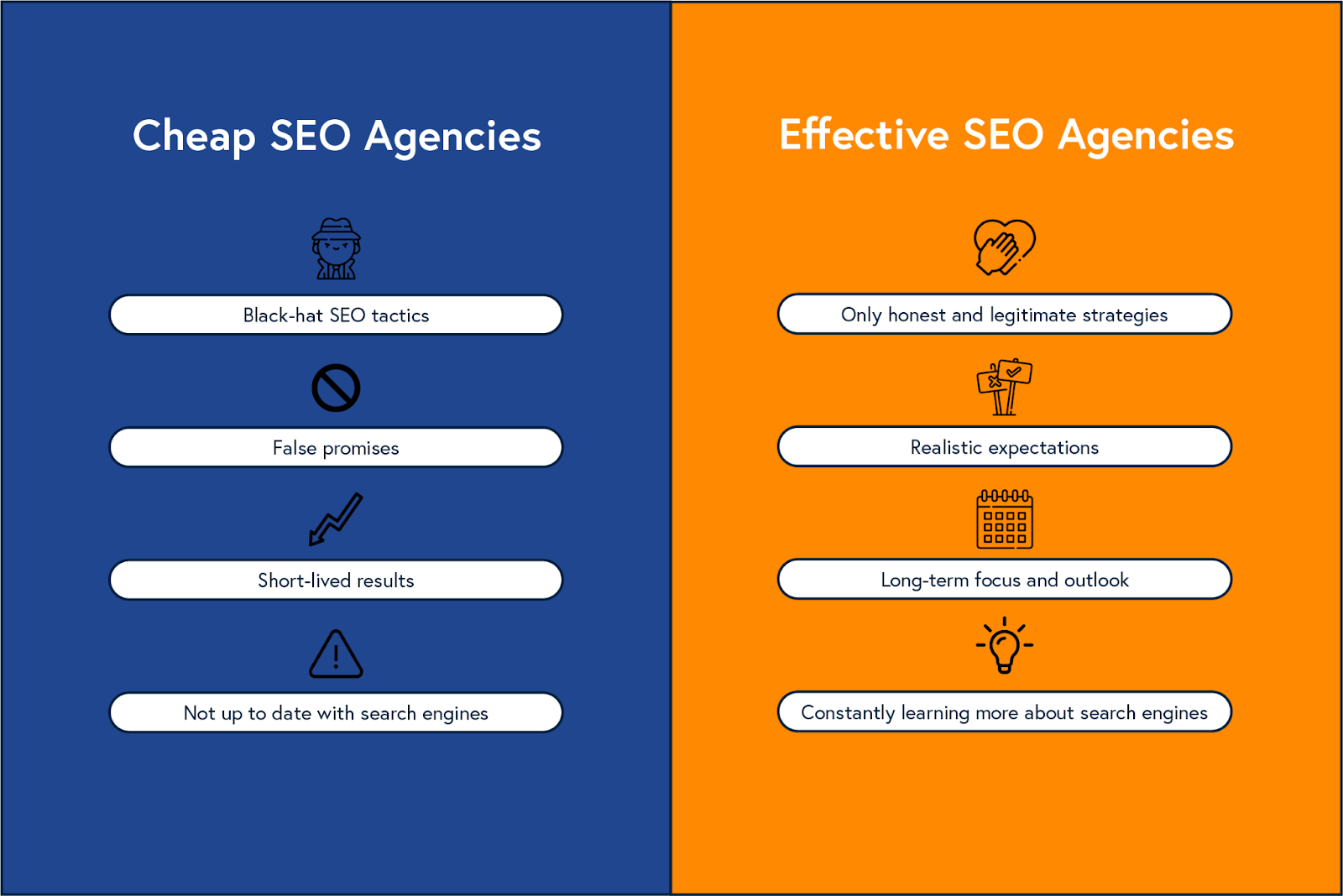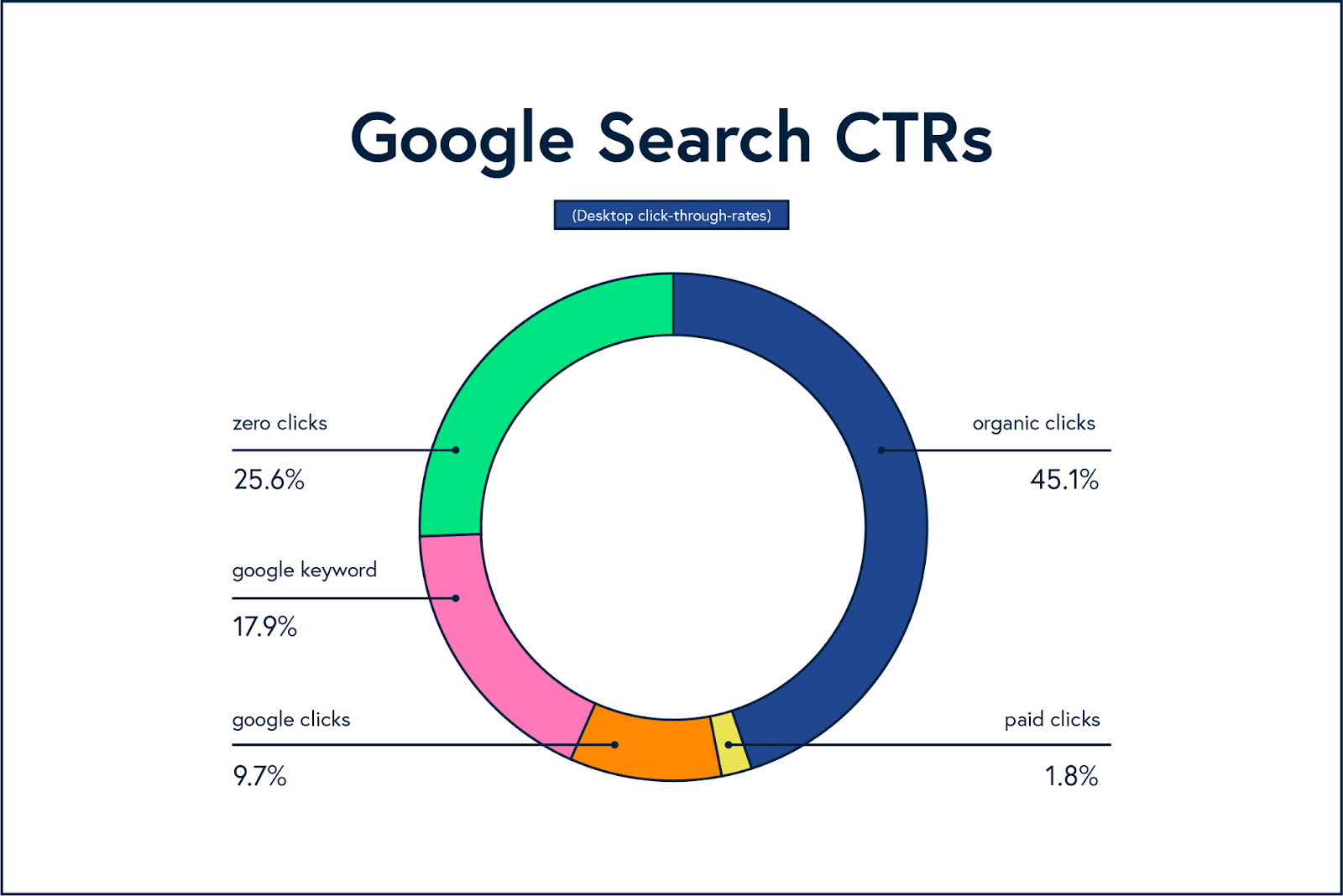Anyone who owns or runs a website should know about search engine optimisation. SEO makes your website more visible on search engines, which are arguably the primary way that people find information, services and products. Keeping your site in Google’s good books will have good effects on your overall business.
Unfortunately, those who may not know a heap about SEO are often prey for companies trying to sell cheap, quick-win SEO services.
(Before moving on, if you don’t get anything else out of this article, at least learn this: SEO is not a quick-wins kind of game.)
Businesses are taken in by their promises of improved rankings, traffic and near-instant growth — all for the cheapest price around! But cheap SEO is cheap for a reason: it’s not good. Does that mean you have to blow all your budget investing in SEO? Not necessarily, but you should know some of the things to really keep in mind.
Thankfully, that’s what you’re reading.
What is search engine optimisation?
If you’ve gotten this far and you aren’t actually sure what SEO is, we need to fix that. Like, right now.
Search engine optimisation (SEO) is the process of increasing the quality and quantity of traffic to your website by improving its position in search results. It involves improving components of your site, including written content, links and technical aspects, to make it easier for search engines to understand and present to users. SEO provides key information on what your target audience is interested in seeing, making your site relevant and user-friendly.
Caught up? Sick — let’s go deeper.
The importance of SEO services
In many ways, websites are at the heart of a brand’s marketing and business strategy. Your website is where you want customers to go to learn more about you, examine your services or products, get in contact, and ultimately form connections.
But consumers won’t always remember your exact name or a URL you’ve told them to visit, which means they have to rely on organic search results to find you. This is where SEO services become vital: SEO service helps you obtain favourable rankings in search results. Given the majority of people will select something that appears in the first 10 search results, ranking high is very important for your business.

Finding a balance — the problem with cheap SEO
Business owners are in a constant battle between finding strategies for growth and remaining in a good financial state. This tension is what makes cheap SEO services popular: business owners hope to create growth without paying too much.
The problem? Cheap SEO isn’t always good SEO. In fact, it very rarely is.
Cheap SEO packages typically take a one-size-fits-all approach to strategy development. But you wouldn’t market a luxury car brand the same way you would a local accountant practice, so why would their websites need the same treatment?
Reasons to avoid cheap SEO
Ok, you can’t just take our word for it — we get that. To help put it into perspective, let’s solve the most important question at play here: what does cheap SEO look like?
Black-hat SEO tactics
Black-hat SEO has long been a big issue in the search industry. These tactics include paying for dirty backlinks, keyword stuffing in your website content, making gateway pages, and even hiding text to rank for unnecessary keywords.
Cheap SEO companies will often rely on tactics like these because they are easy and historically have delivered quick results that can convince clients their investment is paying off. However, over time search engines like Google have redeveloped their algorithms to punish the use of these tactics, giving out ‘site penalties’ to those that break their guidelines. If you have a penalty, Google may remove your website from search results entirely.
I hope the irony of paying for SEO only to end up with no website traffic isn’t lost on anyone.
False promises
“We’ll get you to page one of Google in a month!” “We’ll ensure you start ranking for 100 keywords, no worries!” “We’ve cracked Google’s algorithm!’
A cheap SEO agency will love to promise you the world. They’ll give you something that’s closer to dirt. Basically, if you hear the word ‘guarantee’ come out and it’s about results, just start running.
It’s the best option. SEO agencies and specialists can’t guarantee results because optimisation is not static — algorithms and user behaviour always change and play a massive role. Not to mention the fact that a whole bunch of other companies are probably doing similar work, and at the end of the day, there are only 10 ranking spots on the first page.
Short-lived results
Just because they can’t guarantee results doesn’t mean they won’t get any though, but you will need to be aware that not all of the results delivered will last. Because cheap services often rely on outdated techniques, you might see some quick wins or inflated stats, but these will quickly be lost and your website will likely not see any actual benefits.
Not up to date with search engines
Results also only last for a moment because cheap SEO companies often don’t stay connected with what Google and other search engines are doing and any changes they make to their algorithms and ranking signals. Without this knowledge, whatever work they produce will only waste your investment because it won’t satisfy the standards set by the search engines.

What if my business can only afford cheap SEO services?
If you’re a little light on budget and feel like you could only afford a cheap SEO agency, there’s still plenty you can do instead. An in-house SEO strategy doesn’t necessarily require an SEO specialist. For more information on measuring an SEO campaign, check out our explainer.
It is important to point out that in-house SEO may not be enough to scale your business to the size you want, and working with an affordable SEO agency (not the same as a cheap one) may eventually be an important step for your business. But before you get there, here are our favourite SEO strategies and tips to help you build your presence.
Make use of free keyword research tools
Keyword research might sound like a difficult process, but there are plenty of accessible points that can provide ready-to-use information for you. Free tools like Keyword Generator, Answer the Public and Google Trends can help you find what people are talking about online related to your business or niche, while Keyword Difficulty Checker can give you an indication of how hard it would be to rank for the keywords you’ve found.
These keywords can provide ideas and help you organise your website with appropriate categories and subcategories, headings, meta descriptions and more.
Establish a Google Business Profile
When you type in a business name on Google, most of the time a box appears on the right hand side of your desktop or on the top of your mobile screen with all the information about that business in one neat little package. That’s a Google Business Profile, and setting one up is absolutely free!
Your Business Profile will show up on Google Search and in Maps, helping users to locate you and find out how to contact you with ease. Your profile will also help you capture users who make ‘zero-click searches’ — those searches where users find the answers they need on the search engine results page (SERP) without clicking into a webpage, which make up over a quarter of Google’s traffic.
All you need to do is log into your Google account, click ‘Make a Profile’, enter your business name and follow the steps!

Share your expertise
Without some prior SEO knowledge, two of the practice’s three main pillars — technical SEO and off-site SEO — may be a bit hard to reach. But the third is entirely available and can be one of the best practices for business growth: on-page content.
This refers to written pieces that exist on your website, including pages but also blogs, which small and medium business owners can use to build an audience and develop credibility. Blog writing highlights your expertise in your given niche, adds more opportunities for users to find your site and then navigate to your category pages, and also provides something for other websites to link to, which can give a massive boost to your ranking.
(For more direct info on how to create quality content with SEO in mind, check out our blog on it. Yeah, we do a lot of blog writing too.)
The difference between cheap and affordable SEO services
To put it clearly, affordable SEO plans are what you can fit within your overall marketing budget. Cheap SEO is bad service, poor ongoing results and no likelihood of brand development. You can definitely still get quality cost effective SEO services without spending all of your money, but we do know that it is definitely an investment.
If you really don’t have much to spend, start by using other marketing strategies, and don’t forget tried and true methods like local community outreach. Build an audience early, and when you’re finally ready and able, consider adding SEO into your marketing mix. It will help you maintain everything you’ve already built and give you a pathway to scale upwards.
Melbourne’s SEO experts
If you and your small business want to take the next step with your SEO, get in touch with us today. We can talk you through our process, get started with an SEO audit and help you earn those coveted rankings and organic traffic. If you want quality content, great service and a commitment to excellence, we’re here for you.
Chat soon! ☕️

